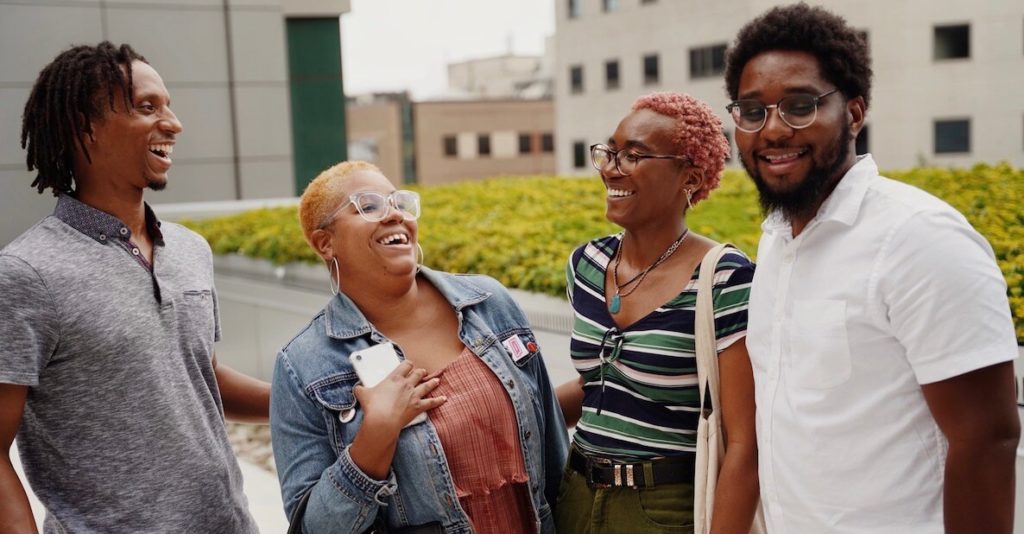In 2017, Shannon Morales was confident her career was on the rise.
She had been in corporate finance for three years, working her way from internships to full-time positions at several different companies. As an Afro-Latina woman and first-generation college grad, she was proud to be succeeding in a predominantly white and male industry.
Then, after two years at one New Jersey company, her boss accused her of falsifying her performance reviews, saying that she couldn’t possibly have achieved everything it said she did. Morales felt his judgement was a result of the unconscious bias so many women of color face, not based on her actual abilities.
“He told me … that everything that I accomplished during that year was a lie,” she says. “And so I quit.”
MORE ON LOCAL COMPANIES BREAKING DIVERSITY BARRIERS
Morales realized she’d have few advancement opportunities if she stayed at a company that denied her abilities. But the experience of blatant workplace bias also sparked an idea. She would fulfill her lifelong goal of becoming an entrepreneur and start a hiring company focused on helping Black and Latinx people get jobs in tech — a sector where they were hugely underrepresented.
In 2017, she launched Echo Me Forward to help minority candidates find jobs at companies she personally vetted. For three years, it was her side hustle—she squeezed it in while working other jobs, most recently in innovation where she helped startups and entrepreneurs work on their own business ideas.

But as she spent more time learning about the startup ecosystem, she wondered: Why couldn’t my business be a scalable multimillion dollar business? Why am I only thinking very small about the things that I could accomplish?
So in 2020, as the world was shifting around her, Morales decided to take a risk. She got accepted into Philly Startup Leader’s (PSL) accelerator program and set to work making her business her full-time gig.
She rebranded. Echo Me Forward became Tribaja, a name that combines the word “tribe” with trabaja (“work” in Spanish) to reflect the business’s new focus on building a community of Black and Latinx people interested in tech careers.
Tribaja connects equity-minded companies — those vetted by Morales and her team — with qualified candidates who are underrepresented in the tech space. In the past year, it has increased its employer partners to 55 and members to 5,000, 97 percent of whom are Black or Latinx and 67 percent of whom are women.
Morales says the business generated $200,000 in revenue last year — including a 300 percent increase in one month — and is poised to continue growing. This year, she hopes to raise $500,000 in seed funding and expand beyond Philly.
Hiring — and supporting — employees of color
Tech companies have spent years trying to diversify their workforces with little success. In 2014, tech giants Google, Apple and Microsoft began releasing diversity statistics in an effort to be more transparent about their hiring practices. That data revealed that between 2014 and 2019 the number of Black and Latinx people working in top tech firms only grew by about a percent.
Across the entire sector, things aren’t much better. A 2019 report from the Bureau of Labor Statistics found that only 5.8 percent of U.S. software developers are Black and only 5.1 percent are Latinx. Tribaja’s website notes that of the over 900,000 unfilled tech jobs in the country only about 7 percent will be filled by Black and Latinx people.
“We try to stay away from being the first point of contact for a company that is looking to be more diverse, where they’re like okay we’re going to hire first and then start being a diverse and inclusive workplace,” Morales says. “Because it takes more than that.”
Tribaja seeks to fill this gap by vetting equity-minded employers, and connecting them to a diverse pool of talent.
Before signing a deal with a company, Morales and her team sit down with them to discuss why they want to diversify their workforce and how they already support employees of color — both during hiring processes and after they join the company. Tribaja works to make sure their members have opportunities to work in offices where they will be valued and treated fairly.
“We try to stay away from being the first point of contact for a company that is looking to be more diverse, where they’re like okay we’re going to hire first and then start being a diverse and inclusive workplace,” Morales says. “Because it takes more than that.”
If the company is a good fit, they can choose from a variety of plans, ranging from $125 to $850 per month, that offer access to Tribaja’s talent directory, the ability to post job openings, recruiting and other services. (Companies can also pay a one-time fee if they just want access to the talent directory.) Tribaja works with a range of local and national tech companies including Boomi, Accent Technologies and Guru.
Users are also added to Tribaja’s 5,000-member Slack community (they’re aiming to reach 10,000 members by the end of the year). The Slack channel includes both job seekers and potential employers, which gives users increased access to recruiters. Job seekers can read a job listing and message a recruiter over Slack with any questions they have, and leverage the Tribaja network by connecting with members who have experience at a company they’re interested in. All services are completely free for job seekers.
Tribaja also works with local tech meetup groups, boot camps and education companies to help members who may be pivoting into tech from other careers build their networks and learn the skills they need to be successful in the industry.
Help making an informed decision
Guru, a software service firm that helps companies create internal “knowledge databases,” began working with Tribaja back when the business was still Echo Me Forward. Last year, Guru partnered with the company to find candidates for their Engineering Apprenticeship Program. The position got a few hundred applicants, with one of the two openings ultimately being filled by a Tribaja candidate.
“Shannon has been a super helpful partner to us at Guru,” says Joe Gomez, Guru’s talent acquisition manager. “Not only does her work align with many of our core values, but getting Shannon’s help increasing visibility for our job openings with a diverse audience has made a big difference.”
Isabelle Kent was working in the human resources technology industry when she signed up with Tribaja back in March. Through the platform, she landed her current position as executive director of Philly Startup Leaders. Kent sees the community-based hiring method as the future of hiring.
“Whether you’re looking on a job board or whether you’re using a recruiting service, [Tribaja] is kind of the best of all of that,” says PSL Executive Director Isabelle Kent.
“Whether you’re looking on a job board or whether you’re using a recruiting service, [Tribaja] is kind of the best of all of that,” says Kent. “They’re willing to be advocates for talent that is often overlooked, but also they’re able to give you that background on what’s this culture like and what’s this hiring manager like and really start giving you that insight so you can make an informed decision.”
Beyond providing networking opportunities, Tribaja supports people who are making career switches by partnering with businesses, like General Assembly, and nonprofits like LaunchCode, to help connect members with the educational resources they need. Soon, the company will be launching a tech career accelerator program with General Assembly to help prepare Tribaja’s members for the upcoming hiring season.
Reaching beyond Philly
Between the job postings, boot camps and recruitment opportunities, Tribaja has helped about 100 people find jobs this past year. Morales hopes to boost that number this year with the firm’s Diversitech events.
Tribaja’s Diversitech Summit is part hiring event part tech conference. At the first summit last March, attendees took coding workshops, learned interview tips and listened to talks by business leaders, including Asif Sadiq, global head of diversity and inclusion at Adidas, and Julissa Prado, founder of Rizo’s Curls.
“The goal is to help connect professionals at this one event, and help them get hired,” Morales says.
That’s what happened with Shenika A. Glover, who had been working as a freelance content writer for Tribaja since January of 2021. She started using the platform to network with folks in the tech industry, and then attended the Diversitech Summit, which offered beginner’s coding workshops.
The March event was such a success that Morales plans to make it annual, and she’s launching smaller Diversitech career fairs to help tech companies diversify their workforce. This fall, Tribaja is partnering with Comcast to host a Diversitech event to help the telecommunications company hire for over 300 roles across seven departments.
Morales also has plans to grow beyond Philly. To figure out where they might want to launch next, they’re doing a series of virtual and in-person “summer socials” in a variety of cities, including New York, Los Angeles and San Francisco.
“Right now, our partnerships are really strong in Philadelphia, but our communities are all over the country,” Morales says. “We want to explore how we can also have more partnerships in the areas where our community resides.”
The Citizen is one of 20 news organizations producing Broke in Philly, a collaborative reporting project on solutions to poverty and the city’s push towards economic justice. Follow the project on Twitter @BrokeInPhilly.

